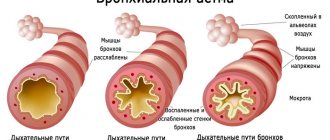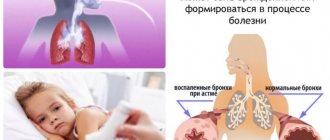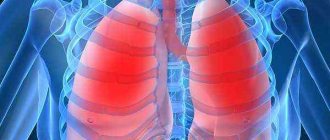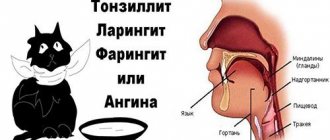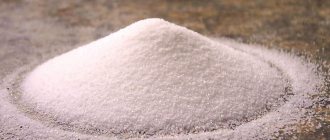Bronchial asthma is a chronic disease. People suffering from this disease often complain of coughing and shortness of breath. These adverse symptoms occur due to spasm of the smooth muscles in the bronchi.
In severe forms of the pathology, a person’s quality of life deteriorates significantly: he cannot communicate normally with an interlocutor due to sudden shortness of breath. In addition, when there is a lack of oxygen in the body, the patient's fingers and toes turn blue. In severe cases, the patient's consciousness becomes confused and he may fall into an asthmatic coma.
It was found that an attack of bronchial asthma often occurs due to the ingestion of a foreign protein into the body. Therefore, the daily menu of a person suffering from this disease should contain limited amounts of protein. Some patients are hypersensitive even to those products that contain components of plant origin.
Hypoallergenic diet for bronchial asthma
Hypoallergenic diet for bronchial asthma
If you have pollen-induced bronchial asthma, an attack may occur when consuming foods containing grains. But dishes that have undergone preliminary culinary processing (porridge) in most cases are not excluded from the menu.
Patients who are allergic to aspirin should avoid products that contain various additives. They are prohibited from eating sweets containing the yellow dye Tatrazine. Drinks made from artificial essences are also contraindicated for such people.
Patients should not eat fish products that contain sodium benzoate. In Russia, salicylic acid is not used as a food additive. But this substance is present in small concentrations in some fruits and vegetables. People who are hypersensitive to salicylic acid may experience bronchospasm when consuming them.
A hypoallergenic diet for bronchial asthma in children should be strict. Foods containing histamine are excluded from the diet. This substance often provokes an allergic reaction. Some types of hard cheese, boiled sausage, and smoked products are rich in histamine. Sauerkraut also contains a lot of this substance. Children should not consume these products even during remission.
What is asthma and its causes
Bronchial asthma is chronic. This disease is characterized by inflammation of the upper respiratory tract, with frequent attacks of suffocation and coughing. Asthma is most often caused by allergic diseases. Among the reasons are the following:
|
|
Don't forget about heredity. Also, the psychological state plays an important role. Asthma symptoms are noticed in people who are in a heightened emotional state and stress. Frequent heartbeat provokes swelling of the mucous membranes. The disease can also occur with mechanical damage to the chest.
Symptoms
You can predict the occurrence of asthma attacks by the following signs:
- Nausea, vomiting;
- Tachycardia;
- Sore throat;
- Swelling of the mucous membranes of the nose and eyes;
- Facial redness.
The attacks of suffocation and coughing usually occur at night. The patient becomes too restless and irritable. Such attacks can last up to six hours.
The importance of diet in bronchial asthma

Doctors recommend steaming dishes and baking them in the oven. Some products must be pre-treated: potatoes should be soaked for at least 12 hours before cooking, and cereals should be left in water for 2 hours.
A diet for bronchial asthma helps strengthen the immune system, reduce inflammation in the body, and restore the sensitivity of the bronchial mucosa.
It is necessary to avoid products containing oxalic acid. Drinks that cause increased excitability (strong coffee, alcohol) are also prohibited.
You should not skimp on your health; you need to buy high-quality and expensive coffee. Manufacturers of inexpensive products often add harmful additives to their products. You shouldn’t buy small bags of coffee either: it has nothing to do with the noble drink.
If you have bronchial asthma, you should limit your salt intake. The patient should exclude pickled vegetables and salty foods from his diet.
You also need to pay attention to the serving size. Overeating leads to stomach distension and increases the likelihood of an asthma attack. It is not recommended to eat before bed.
In most cases, the patient does not need to limit carbohydrate intake. In case of severe disease, decreased glucose tolerance, or long-term use of glucocorticosteroids, it is necessary to replace baked flour products and pasta with fresh fruits and juices.
According to experts, the patient needs to drink enough fluids. But if severe swelling or poor circulation in the body occurs, it is recommended to drink no more than 1 liter of liquid. At the same time, dairy products must be present in the diet. They contain calcium and potassium salts. Dairy products have antimicrobial and anti-inflammatory properties. In mild forms of bronchial asthma, drinking low-alcohol drinks in small quantities is allowed.
For people who have been diagnosed with bronchial asthma, diet is vital. But we should not forget that meals should be fractional. You need to eat at least five times a day. In the absence of contraindications, fasting days can be arranged. At this time, it is recommended to only drink weakly infused tea. The average daily energy value should not exceed 2230 kcal.
Late dinners are not welcome: it is recommended to eat your last meal no later than a couple of hours before bedtime.
Varieties
Elimination diet
In the atonic form of the disease with identified food allergens, an elimination diet is prescribed, in which only foods that reliably cause attacks of bronchial asthma are excluded, and not all foods with “high antigenic potency.” Foods that are known to cause allergic reactions are excluded from the diet. At the same time, not only the products themselves are excluded, but also dishes containing them. For example, if you are intolerant to chicken eggs, exclude mayonnaise, creams, baked goods, casseroles and all dishes that contain eggs in the recipe. Otherwise, nutrition should be physiologically complete, with a stronger limitation of easily digestible carbohydrates.
It is recommended to replace sugar with saccharin , xylitol , and sweetener . Significantly reduce table salt and the consumption of salty foods; it is advisable to increase the content of vegetable oils in the diet. Dishes are prepared stewed, boiled, baked, but not fried. In the atonic form, regular bowel movements are extremely important.
In case of constipation, the diet includes foods and dishes that have a laxative effect. The diet is enriched with foods containing calcium (fermented milk products, cottage cheese), which has an antiallergic effect. When excluding any products from the diet, you should select appropriate equivalent substitutes. For example, replace whole cow's milk with soy milk, fish with legumes and cottage cheese.
Fasting and dietary therapy
A type of diet therapy includes fasting-dietary therapy, prescribed for severe forms of the disease (a combination of drug and polyvalent food allergies, bronchial asthma and obesity , psoriasis and eczema ). It is contraindicated during pregnancy and lactation, active tuberculosis , dysfunction of internal organs, children and the elderly.
Fasting-dietary therapy for asthmatics involves hospitalization of the patient; it is strictly prohibited to carry it out at home and without a doctor’s prescription. However, as an alternative, short courses of fasting can be recommended, which are almost as effective, but less dangerous in terms of associated complications. The duration of such courses is 3–7 days.
Approximate menu for each day

If a patient is prescribed a diet for bronchial asthma, he can follow the following menu:
- In the morning you should eat 100 grams of meat pate, 200 grams of buckwheat porridge. Food should be washed down with tea.
- The second breakfast consists of several fresh apples.
- For lunch you need to prepare vegetable soup, 200 grams of mashed potatoes, 100 grams of boiled meat. Compote made from dried fruits will complement the meal.
- For an afternoon snack, you should drink 200 ml of rosehip decoction.
- In the evening you can eat carrot zrazy, 100 grams of boiled fish. The meal is washed down with weakly brewed tea.
- Before going to bed, it is recommended to drink 200 ml of kefir or other fermented milk drink.
You are allowed to eat no more than 300 grams of bread per day. For bronchial asthma, you need to take vitamin-mineral complexes containing vitamins B, C and E. These substances have an antioxidant effect on the patient’s body.
Main goals of dietary nutrition
For bronchial diseases, the nutritionist prescribes a special table - No. 9 to normalize the metabolic process and prevent the development of

A diet for bronchial asthma should have the following composition and caloric content:
- proteins 100 - 130 g;
- lipids - 85 g;
- complex carbohydrates – 300 g;
- amount of liquid 1.5 - 1.8 l;
- daily salt intake for adults – no more than 10 g;
- food temperature - no less than +15 and no more than +65°C;
- energy value during the day is not less than 2600 to 2700 kcal.
Treatment table No. 9 is designed taking into account the stabilization of carbohydrate metabolism and a positive effect on the overall metabolism in the body. Table No. 9 can be used not only for bronchial diseases, but also for those prone to allergies and other diseases associated with metabolic disorders.
List of useful products
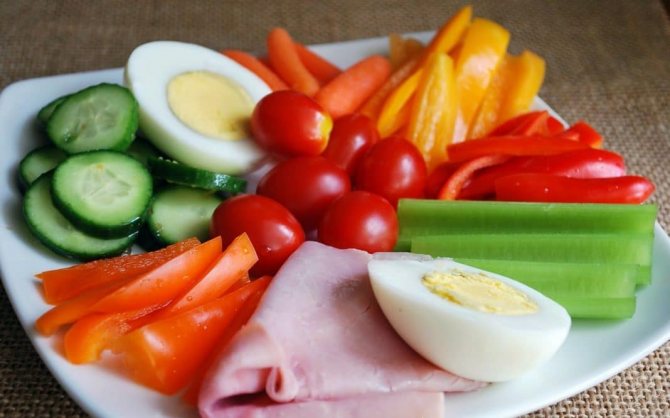
If you have this disease, you should eat the following foods:
- Apples. They contain a large amount of pectin. You can make delicious puree from apples and bake them in the oven along with other products.
- Vegetables. Thanks to carrots, sweet peppers, tomatoes, and herbs, a person’s immunity increases. These vegetables contain a lot of beta keratin and selenium. They have a general strengthening effect on the body.
- Cereals. They are a source of vitamin E.
- Yogurts that do not contain additives provide the patient with calcium and zinc.
- Lean meats. They are rich in a substance such as phosphorus. This meat contains healthy dietary fiber.
- Chicken liver. This product is rich in vitamin B12. It improves the condition of the hematopoietic system and thyroid gland. The product can be eaten by small children. Chicken liver is not recommended for people with high cholesterol.
- Wheat bread. It contains a large amount of zinc. Wheat bread increases the body's resistance to allergens.
General description of asthma
The respiratory system has a disease called asthma. Its attacks occur when a foreign body or some allergen, cold or humid air, or physical exertion enters the lungs through the trachea, causing irritation of the mucous membrane in the respiratory tract, followed by blockage and suffocation. It is this condition that is called asthma.
Free breathing with this disease is a happy moment for the patient. When an attack occurs, the bronchi spasm, the lumen narrows, preventing the free flow of air. Now more than half of all asthma cases are diagnosed in children under 10 years of age. Most often this disease is observed in men. Doctors also note the hereditary component of this disease. Asthma is the most common condition among smokers.
In most cases, in patients with asthma, it is impossible to predict the duration of the attack and the severity of the disease. Sometimes attacks threaten a person’s life and health if medical assistance is not provided in time.
Symptoms of asthma may include:
- wheezing;
- feeling of panic;
- difficulty breathing;
- sweating;
- painless chest tightness;
- dry cough.
Severe forms of asthma are characterized by the following symptoms:
- it is difficult for a person to finish a sentence due to severe shortness of breath;
- wheezing becomes almost inaudible, since very little air passes through the respiratory tract;
- lack of oxygen leads to blue lips, tongue, fingers and toes;
- confusion and coma.
Modern approaches to the treatment of asthma include mandatory testing to identify allergens, training in response and self-help during asthma attacks, and selection of medications. There are two main forms of medications—fast-acting symptom relievers and control medications.
How to reduce the likelihood of an asthma attack?

Before using these recommendations, you should consult your doctor. Basic tips for bronchial asthma:
- You can soak a few dried figs overnight and eat them throughout the day.
- It is recommended to include ginger juice and ginger tea in your diet.
- If you have bronchial diseases, you can use the following recipe: 10 garlic cloves pour 0.3 liters of milk. The mixture is placed on the fire, it must be boiled for at least 15 minutes. Then the resulting decoction must be filtered; it must be drunk half a glass three times a day. The duration of the course of treatment is at least five days.
- To alleviate the patient's condition, a decoction of flax seeds is also used: pour 5 grams of finely ground seeds into 200 ml of boiling water. The product is boiled for at least 20 minutes, then the broth must be strained. It is drunk 50 ml twice a day.
- For bronchial disease, you can take tincture of pine cones. It has anti-inflammatory, expectorant and antiseptic properties. When consuming pine tincture, a person’s immunity increases, the body is cleansed of toxins, and the process of sputum discharge is accelerated. The product must be prepared as follows: 100 grams of pine cones are poured with 400 ml of alcohol. The mixture must be infused for at least 10 days, then it must be filtered. Take 5 ml of the drug twice a day.
If the patient has been diagnosed with bronchial asthma, the diet should be prepared by a competent and highly qualified doctor. He will be able to take into account the individual characteristics of the patient.
Prohibited or partially restricted products

When dieting during the treatment of bronchial asthma, some foods containing large amounts of saturated lipids, cholesterol, oxalic acid and other substances that are difficult to break down are prohibited.
It is much more difficult for a weakened body to digest heavy food, and some foods can lead to an exacerbation of the disease.
What not to eat if you have bronchial asthma:
- semolina porridge, pasta and vermicelli;
- nuts, sunflower and pumpkin seeds, some early-ripening vegetables, garlic and onions, pickled cabbage;
- citrus fruits, pineapples, cranberries, blackberries;
- margarine, lard, lamb;
- raw and fried eggs, sausage, especially smoked, canned foods;
- spicy pickled vegetables, too sour or spicy foods;
- mustard, hot pepper, sauces (adjika, ketchup, mayonnaise);
- fresh milk and full-fat sour cream;
- meat with a high lipid content, chicken, strong broths;
- seafood;
- drinks obtained by fermentation (kvass, beer) containing a high percentage of gas;
- strong alcoholic and stimulating drinks (coffee, cocoa);
- bakery products with a high sugar content;
- fresh baked goods.
List of products allowed for consumption in limited quantities:
- rye and corn porridge;
- all types of mushrooms, eggplants, radishes and radishes, grapes;
- butter;
- per day you can have up to 20 grams of sugar and up to 8 grams of salt;
- skim milk can only be consumed by adding it to porridge;
- leaf teas, green and black;
- white butter bread.
Diet for children
Products that are undesirable to consume even during remission are smoked meats, hard cheeses, canned food, sauerkraut, fast food. Milk and chicken eggs often cause reactions.
Children should have only high-quality, freshly prepared food on their menu. It should be borne in mind that as the child gets older, certain foods may no longer be irritants. Diet adjustments will be required, which must be approved by an allergist or pediatrician.
This therapeutic nutrition system for asthmatics is balanced and helps stabilize the patient’s health. The main thing is strict adherence to it.
Diet for adults
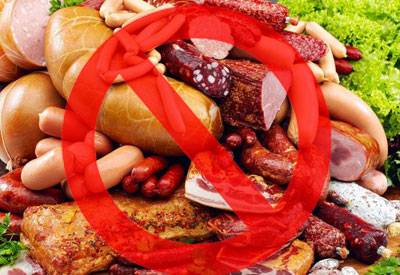
To reduce the body’s allergic predisposition to certain substances, it is necessary to minimize any sweet foods in the diet.
Diet for bronchial asthma in adults should be low in salt. This substance increases the body’s sensitivity to various irritants and significantly increases the sensitivity of the bronchi. For this reason, you should not add too much salt to foods, or add salt to already finished products. In addition, salt tends to retain fluid in the body, which means that there may be swelling of the respiratory system.
The diet for asthmatics should be selected without vinegar, various sauces and seasonings. You should even exclude fresh onions and garlic, since the phytoncides contained in these products can cause an exacerbation of the disease. If a person cannot do without these vegetables, then they are pre-treated thermally.
Smoked meats and pickles are very harmful for asthmatics, as they greatly irritate the pancreas and gall bladder. It is worth excluding exotic foods from your diet, which include all citrus fruits.
You need to choose tea and coffee very carefully for an asthmatic. It is worth buying only premium drinks, since various additives can cause allergies and cause an attack of suffocation . If you are not confident in the quality of the purchased drinks, then it is better to refuse them and drink a decoction of rose hips or medicinal herbs that do not cause allergies.
An asthmatic should consume a lot of vegetables and fruits that grow in the place where they live.

